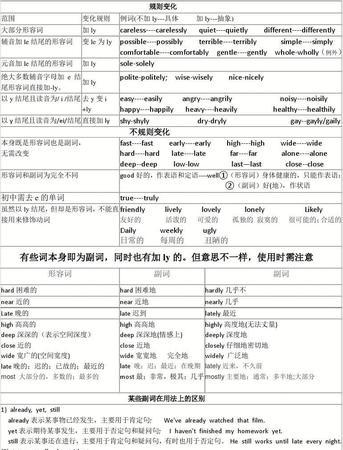在英语语法中,形容词和副词的不规则变化需要记忆和练习。一些常见的不规则变化包括形容词如"Good - Better - Best","Bad - Worse - Worst","Little - Less - Least",以及副词如"Well - Better - Best","Badly - Worse - Worst","Little - Less - Least"。记住并练习使用这些变化可以提高英语水平。

形容词的不规则变化
- Good - Better - Best
- Good 表示“好”的意思,比较级是 Better,最高级是 Best。
- 例如:This is a good book.(这是一本好书。) This book is better than that one.(这本书比那本书好。) This is the best book I have ever read.(这是我读过的最好的书。)
- Bad - Worse - Worst
- Bad 表示“坏”的意思,比较级是 Worse,最高级是 Worst。
- 例如:This is a bad idea.(这是一个坏主意。) This idea is worse than the last one.(这个主意比上一个更糟。) This is the worst idea I have ever heard.(这是我听过的最糟糕的主意。)
- Little - Less - Least
- Little 表示“小”的意思,比较级是 Less,最高级是 Least。
- 例如:This is a little problem.(这是一个小问题。) This problem is less serious than the last one.(这个问题比上一个不太严重。) This is the least important problem we have.(这是我们最不重要的问题。)
副词的不规则变化
- Well - Better - Best
- Well 表示“好”的意思,比较级是 Better,最高级是 Best。
- 例如:He speaks English well.(他英语说得好。) He speaks English better than his brother.(他比他的兄弟英语说得更好。) He speaks English the best of anyone I know.(他是我认识的人里英语说得最好的。)
- Badly - Worse - Worst
- Badly 表示“坏”的意思,比较级是 Worse,最高级是 Worst。
- 例如:He plays the piano badly.(他钢琴弹得不好。) He plays the piano worse than his sister.(他比他的姐姐钢琴弹得更差。) He plays the piano the worst of anyone I know.(他是我认识的人里钢琴弹得最差的。)
- Little - Less - Least
- Little 表示“少”的意思,比较级是 Less,最高级是 Least。
- 例如:He has little experience.(他经验很少。) He has less experience than his colleague.(他比他的同事经验更少。) He has the least experience of anyone in the company.(他在公司里经验最少。)

